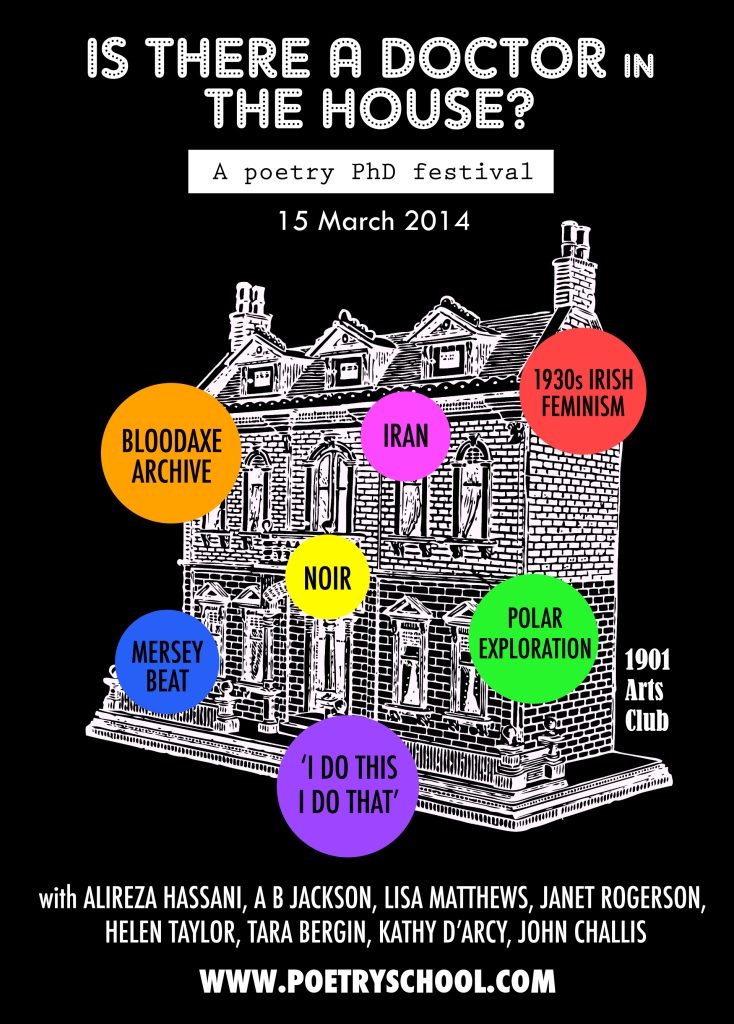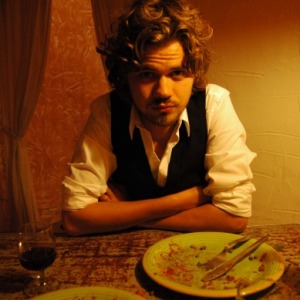The third of our eight Is There A Doctor in the House? poets is John Challis. John has started a PhD in Creative Writing at Newcastle University on contemporary poetry and Film Noir, and now works as a teaching associate.
Hi John – tell us a bit about your PhD
John: My PhD is concerned with identifying the poem noir; a poem that contains the stylistic attributes, as well as a underlying moods of pessimism, anxiety and obsession, that are commonly found in the films noir of the 1940s and 1950s (Double Indemnity, The Killers, Kiss Me Deadly) and later neo-noir films produced from the 1970s onwards (Taxi Driver, Klute, Memento). Given the difficulties scholars have faced in defining film noir as a genre, it is accepted amongst critics that the tone of film noir transcends the 1940s and 1950s, and traces of noir can be found in many other mediums, including poetry. As well as producing a collection of poems that explore the themes of film noir, critically, my PhD works to identity what the poem noir is, and what types of poems are poem noirs, focusing on Paul Muldoon’s ‘Immram’ (1980), Deryn Rees-Jones’ book length sequence of poems Quiver (2004), and David Harsent’s ‘Elsewhere’ (2011).
Tell us a bit about what you’re planning to offer in your lecture / workshop?
John: In my lecture I will explain what the poem noir is through using examples of film noir plots, characters, visuals, and storytelling devices. This will form a sounding board of key things to look for in a potential poem noir, from mode of delivery, to imagery, and mood. I’ll introduce a few poems that I consider poem noirs, and consider the role and function of a poem noir within contemporary poetry. A key theme in film noir is the exploration of identity. Often protagonists have lost, or are loosing their identities, and desperately struggle to reconnect within themselves, which often results in them becoming embroiled in some dangerous plot. In the workshop, we’ll have a go at writing our own poem noirs by acting as detectives of ourselves.
How are your studies affecting your writing?
John: When I was originally planning and applying to do a PhD in Creative Writing, I wanted to pair my critical studies with the kind of themes I was interested in reading about and writing myself. A lot of my time working on the thesis has been spent watching many films noir and reading film criticism, and as such, I’ve found that the critical research has helped to feed ideas for poems. Although, I do have to set clear times for the critical work otherwise the impulse to work on a poem tends to take over.
What’s been the best ‘eureka’ moment in your research?
John: Conducting this research has been a little bit like shouting into a well. The more I’ve shouted into the well of noir, the more the theme of film noir seems to resonate with everything from fashion and music, to TV programmes such as the recent burst of Nordic noir (The Killing and The Bridge), and even the study of morality in shows as diverse as the UK’s Luther and the US’ Breaking Bad. There comes a point where everything seems to become fundamentally noir. The scholar Wheeler Winston Dixon claims ‘This is the age of film noir’, and cites examples as diverse as reality television shows and world events such as 9/11 as the reasons for our current noir states of mind. For him, we live in both paranoid and conflicted times, where our own identities are constantly called into question. In that sense those ‘eureka’ moments often reoccur and I’ll drop whatever it is that I’m doing to say: that’s so film noir.
Which other lectures / workshops are you going to sit in on at the festival?
John: I’d love to attend them all, as they all sound fantastic. I’ve wanted to write a ‘found’ poem for awhile now, perhaps by using the often-brilliant lines from old films noir that range from the hilarious and witty, to the pretentious and wise, so I’ll be attending A B Jackson’s ‘Erasures’ workshop. I’m also interested in archives, and their role in the digital age, so Tara Bergin’s archive workshop will be a must. I’ll also aim to attend Janet Robertson’s ‘Sound in Poetry’ lecture along with A B Jackson’s ‘The Poetry of Polar Exploration’, and I’d be very interested to learn more about the translation process with Alireza Hassani.
Are you going to put ‘Dr’ on your credit cards?
John: Good question. In the words of Bradford Gait in The Dark Corner – “I’m playing this by the book, and I won’t even trip over a comma.”

Is There a Doctor in the House? — 15 March 2014 — 10am until 5:30pm
1901 Arts Club, 7 Exton Street, London SE1 8UE
A full programme of lectures and workshops is available here. To book, visit www.poetryschool.com or ring 0207 582 1679

Add your Reply
You must be logged in to post a comment.